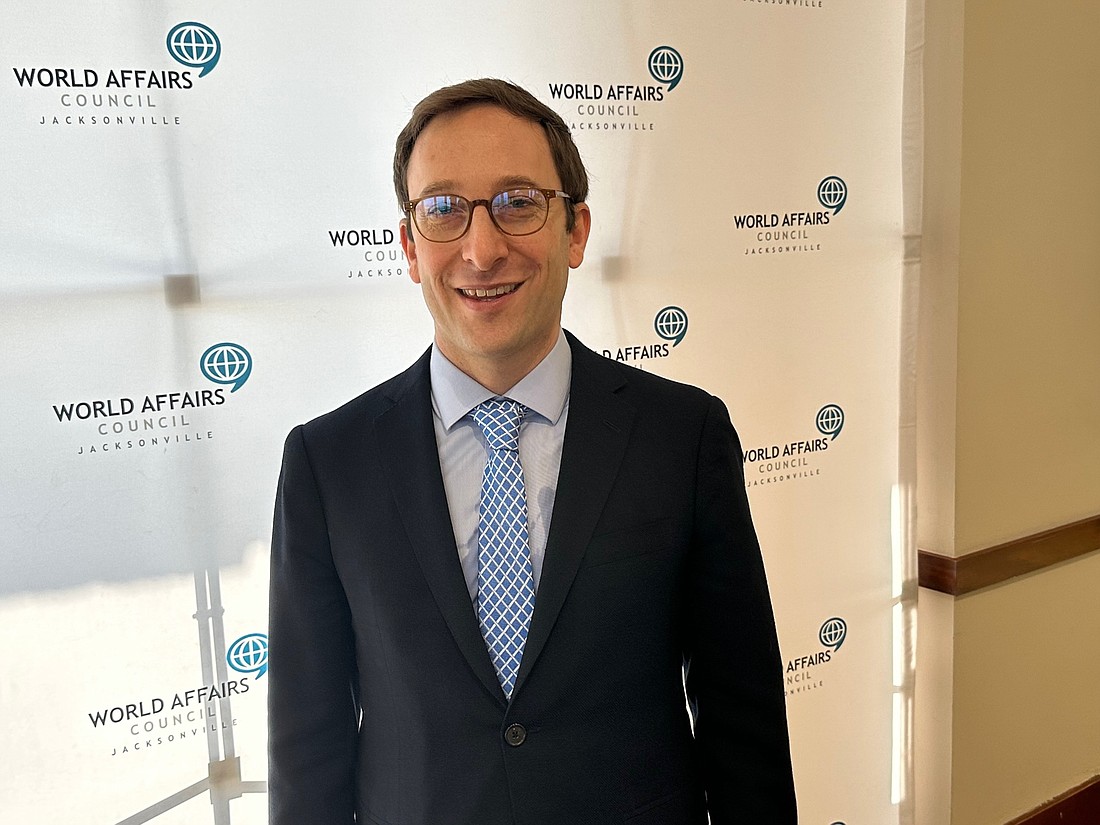
Yes, the U.S. economy could be heading into a mild recession and inflation will remain higher than normal in the coming months, according to Simon Rabinovitch, U.S. Economics Editor of The Economist financial publication.
However, in a Jan. 10 talk to the World Affairs Council of Jacksonville, Rabinovitch struck a generally optimistic tone about 2023.
He said the economy could slip into a recession in the first half of the year. But “on a full-year basis, America will not contract.”
Rabinovitch also expects inflation to improve. While inflation is running at an annualized 7% rate now, he thinks it will fall to 3% to 4% by the end of this year.
“It’s beginning to approach the levels we’re all used to in a pre-pandemic world,” Rabinovitch said in his presentation at the Downtown River Club.
Prices of goods such as electronics and furniture are already falling as freight costs revert to pre-coronavirus pandemic levels, he said.
Property prices also are falling but renters are not yet benefiting because rents tend to lag behind property prices by about six months. But renters will get a break soon, Rabinovitch said.
“That’s going to happen in the next couple of months,” he said.
However, prices are still rising in service sectors such as travel and restaurants.
“Where we’re not back to normal is on the wages side,” Rabinovitch said.
The tight labor market is forcing U.S. businesses to pay higher salaries to attract workers, and that prompts businesses to raise prices.
Rabinovitch said the ratio of job openings to workers in the U.S. is 2-to-1 when it usually has been closer to a 1-to-1 ratio.
“No wonder it’s difficult for companies in every sector to find people,” he said.
Rabinovitch said he thinks two main factors are causing the labor shortage. One is a big spate of early retirements by U.S. workers.
“A lot of people brought their retirement forward during the pandemic,” he said.
The other factor is a reduction in legal immigrants filling openings in some sectors.
“Nationally, the labor force is missing 1.5 million foreign-born workers,” he said.
Rabinovitch said the trends are resulting in the Federal Reserve Board keeping interest rates higher.
“The Federal Reserve very obviously cannot create supply” in the labor force, he said.
“What they can do is reduce demand” by keeping rates high.
The recent inflation rates historically would lead to a recession. Rabinovitch displayed a chart showing since 1950, “every time the U.S. has had inflation above 5% it has been followed by a recession.”
However, the tight job market is keeping businesses from laying off workers, which is helping the economy.
“Companies appear, at least at this point in time, to be hoarding workers,” he said.
“It will probably be a very mild recession.”
Rabinovitch, who spent more than 10 years reporting on finance and economics from China, said the end of coronavirus restrictions in China will spark big growth this year.
The Chinese economy could grow by 10%, which Rabinovitch said will be a positive for the global economy.
“That’s going to be a tremendous rebound,” he said.
“This is likely to be the big story of the year.”